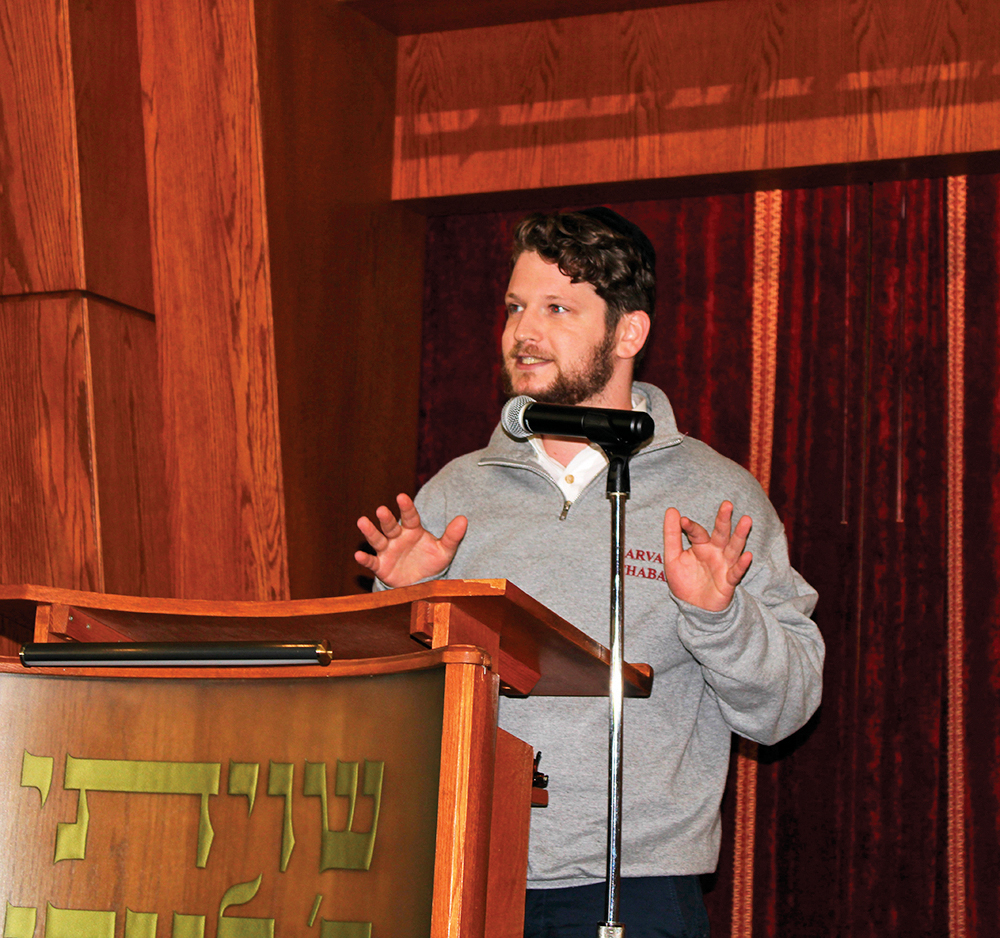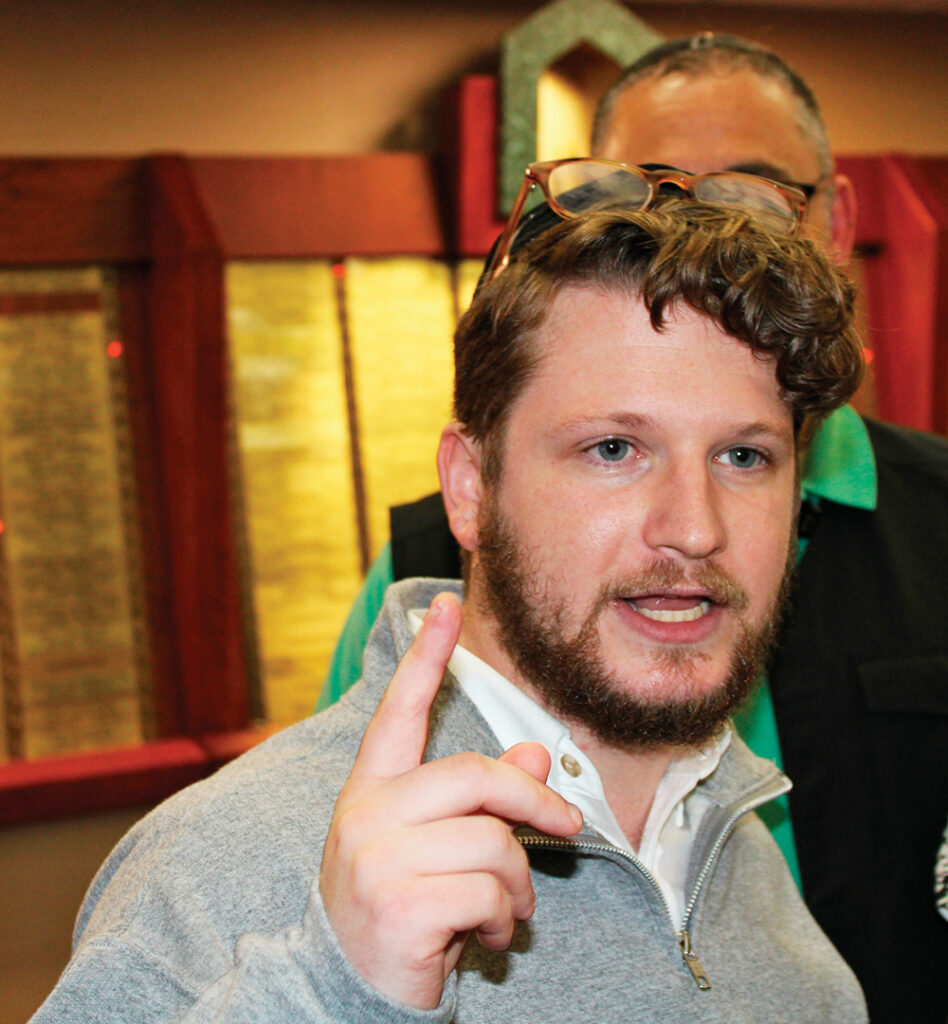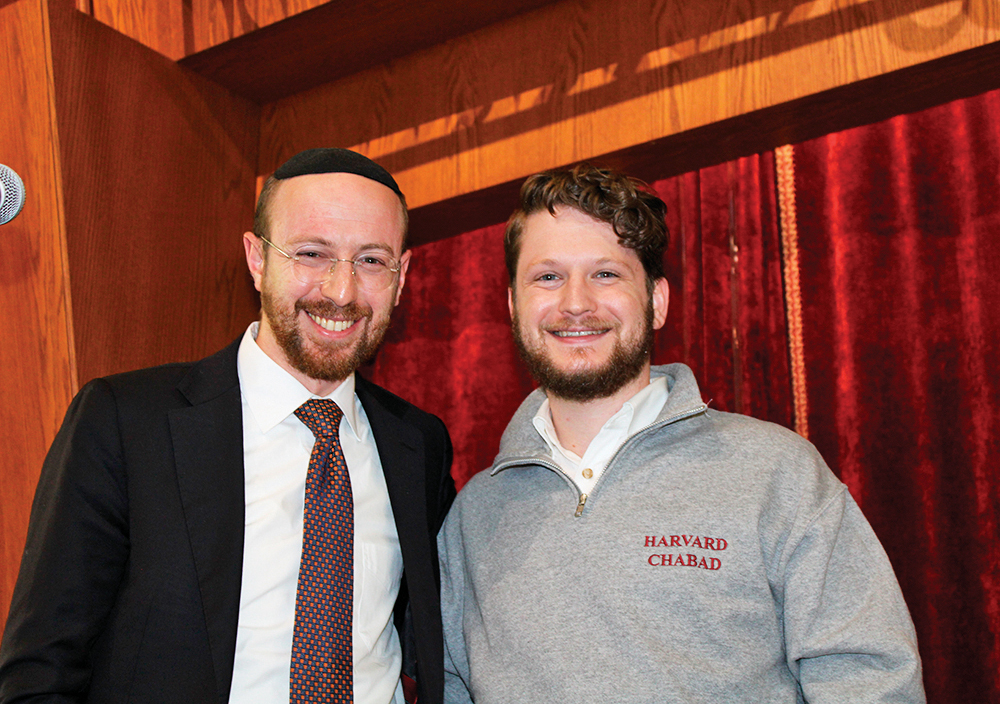
The hundreds who gathered at Bnai Yeshurun in Teaneck on Monday evening, July 29, no doubt were drawn to the event by their image of a 25-year-old standing before the Republican National Convention (RNC) on July 17, donning a black kippah and a dog tag necklace, urging the release of the hostages, proudly declaring, “My name is Shabbos Kestenbaum. I am a proud, first generation American. I am a proud Orthodox Jew. As of five months ago, I am the proud plaintiff suing Harvard University for its failure to combat antisemitism.”
Shabbos Kestenbaum, a Teaneck native, attended Yeshivat Noam. After his family relocated to Riverdale, he attended SAR and spent summers at Camp Moshava IO. In Israel, he was a student at Aish HaTorah. He attended Queens College, where he served as president of Hillel. Kestenbaum has been involved in the OU’s NCSY programs as a leader and advisor of Jewish students.
Prior to his meteoric rise to fame after the RNC, Kestenbaum had testified on many occasions about the antisemitism being perpetrated on college campuses, specifically at Harvard where he was enrolled in a master’s program at the Harvard Divinity School. He testified before the Congressional House Education and Workforce Committee that after contacting Harvard’s Antisemitism Task Force more than 40 times about the hate that he was witnessing on campus, he never received any replies.

This blatant silence motivated him to file a lawsuit against Harvard, from which he received his degree in May. The lawsuit alleges that “Harvard is a bastion of anti-Jewish hatred and harassment and yet its administration refuses to lift a finger to stop and deter this outrageous antisemitic conduct and penalize the students and faculty who perpetrate it.” Although deliberations have begun on the lawsuit, a ruling will be long in coming. In the meantime, Kestenbaum will be speaking out about the proliferation of rabid antisemitism on campuses throughout the country, including at many of the highly regarded Ivy League colleges and universities.
A declared Democrat who has consistently voted for the party, Kestenbaum eagerly agreed to speak at the RNC convention. He was quoted as commenting, “For whatever reason, the Democratic Party has decided to do almost nothing to combat antisemitism. So I’m sort of caught between a rock and a hard place. I don’t support the Republican Party, but if they are going to provide me with a platform and an opportunity to speak about my personal experiences, then of course I will take it. If the Democratic Party invites me to speak, it would be an honor to do so, but unfortunately they are not interested in the story.”
While backstage waiting to be introduced at the convention, Kestenbaum had an opportunity to speak with the parents of Israeli hostage Omer Neutra, who also feel the responsibility to speak out whenever and wherever possible on behalf of their son’s return along with the other more than 100 hostages still being held in Gaza.
During his animated presentation at Bnai Yeshurun, Kestenbaum shared many of the egregious incidents of antisemitism that he witnessed at Harvard since Oct. 7. Prior to the current outbreak, Harvard has had a murky historical record of antisemitic policies. During the 1920s and 1930s, when Harvard’s quotas for Jewish students was already in place, the student body was 25% Jewish. Today, in a supposed tolerant society, the Jewish population at Harvard is only 4%. Ironically, Lowell House, which houses the Jewish students on campus, was named for the early president of Harvard known for his rabid antisemitism.
In the rankings of FIRE, an organization that rates universities on their promotion of freedom of speech and individual rights, Harvard was ranked 248 out of 250. Harvard was touted as hosting speakers who promote rhetoric that encourages violence against specific groups without opposition.

After Oct. 7, 34 student groups at Harvard drafted emergency statements blaming the Jews themselves for the heinous massacre. When YouTube shared an interview with three anti-Israel student leaders, they shrugged their shoulders and showed no remorse for their statements. On Oct. 11, Harvard professors were quoted as saying, “In order to understand the story, you must see both sides.”
Kestenbaum was outraged that none of his professors who knew of his personal connections to Israel through family came to him with any consolation. Shortly after the outbreak of the war, he bought a one-way ticket to Israel where he immediately rolled up his sleeves to participate in the war effort. During those weeks, he dug fresh graves for the heroic IDF soldiers who fell in battle, entertained the wounded in hospitals, and delivered supplies to army bases among other activities. “These painful activities were better for my mental health than being at Harvard.”
Back at Harvard, rallies hosted speakers that claimed that Hamas is not a terrorist organization and in 10 years will be regarded as freedom fighters. A Harvard WhatsApp debating group declared “Long Live Palestinian Night of Oct. 7.” American and Israeli flags were vandalized in knee-jerk reactions of hateful students, and pro-Israel posters were regularly torn down.
Upon returning to campus, Kestenbaum was the target of constant death threats. He was challenged to a debate as to whether 9/11 was an Israeli action. During the notorious campus encampments, when outside protestors were allowed entry to the campus to disrupt and destroy, self-appointed safety marshals monitored the movements of Jewish students and took pictures of them. President Allen Garber, himself a Jew, who was caricatured as the devil with horns and a tail, was ineffective in clearing the campus of agitators. Only 13 students were sanctioned and suspended for their activities and in the end the sanctions of 11 of them were revoked.
Kestenbaum foresees that if his “gifted” classmates at Harvard become the future leaders of the country, American Jews are in for a sorry future. He proposed three courses of action. First, the Jewish community must battle Oct. 7 on both the battlefield against Hamas and other enemies on the ground. And equally important, American Jews must battle antisemitism in academia and wherever it rears its ugly head. The community must give voice to students who are experiencing firsthand the lies and distortions that are being disseminated at places of higher learning. Shuls, schools and Jewish organizations across the spectrum must be urged to address these issues seriously and amplify them and the huge Jewish organizations must be encouraged to unify in their fight against campus antisemitism.
During the Q&A, questions were raised as to whether parents should still be sending their children to Ivy League schools, to which Kestenbaum replied, “Send your children to places where they are loved, not hated or pillaged.”
Of the five plaintiffs who are bringing the charges against Harvard, all from different schools, departments and areas of study at the school, Kestenbaum is the only one to identify himself and speak out publicly about the action. His hope is that, “Be it professors who cancel classes to encourage students to demand Palestine be ‘freed from the River to the Sea,’ being yelled at to ‘globalize the Intifada’ on my way to class, the drawing of swastikas across campus, Harvard’s unwillingness to discipline students immersed in hate or the many other offenses alleged in our lawsuit, we hope that this move gives a voice to all those who have been on the receiving end of hatred, bigotry and discrimination.”








